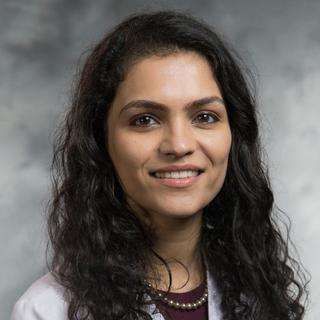
Prachi Parikh, MD, had a lifelong interest in both math and physics which she maintained even as she entered medical school and her neurology residency. So when the study of epilepsy combined those interests along with the intricacies of the brain and an ability to help patients she knew the specialty would be for her. In this week’s “Spotlight” interview, the new addition to our faculty shares some of the intersections between neurology and women’s health. Parikh also discusses how every visit is a learning opportunity both for her and her patients and shares her loves of cooking, traveling, and spending time with her one year old when she’s not at Duke.
What are your current responsibilities within the Neurology Department? What does a typical day look like for you?
I work almost exclusively with epilepsy patients. I have epilepsy clinic three days a week, am on EMU (epilepsy monitoring unit) service for about 2 months a year and work at the VA as well. A typical clinic day is from 8am to 5pm two days and 9am to 1pm on one day with a mix of new and follow ups. I mostly see new patients since I am building my practice still. On Tuesdays and Fridays I do not have clinic. I am working to build the HD EEG program, ESI (EEG source imaging) and women with epilepsy program at Duke. In addition to this I spend some time at the VA on those days.
How and when did you first get interested in neurology? How did you decide to specialize in epilepsy?
It was during the intense neuroanatomy sessions. We had a very strict anatomy professor who ensured we read before every lecture. Strangely the complexity of the brain is what intrigued me. During my medical school clinical rotations my love for neurology was further enforced with localization challenges.
Entering neurology I always thought I would specialize in stroke. But doing months of stroke as a PGY-2, I realized I did not feel as strongly about it. As PGY-3’s we had a two-month long EEG course.
I always loved math and physics and epilepsy comes closest to both. Learning about all the potentials generated by the brain, localization, surgical planning, epilepsy semiology and surgical epilepsy conferences generated a curiosity and excitement which no other subspecialty did. At first I thought I would do one year but the more I learned the more I realized that there was so much more to learn and thus I decided to do a second year in epilepsy.
What do you enjoy most about your work?
Growth. I feel there is a chance to grow and learn from every patient, every success and failure. Having experienced and welcoming colleagues who you can turn to for discussing a patient, an outcome, for solutions makes working an enjoyable experience!
What’s the hardest part of your job?
Not knowing! Sometimes after putting in all the thought, taking all test results into consideration we implant patients and don’t get the answers we expected. I feel extremely defeated every time that happens. We do our best but it is not possible to cure all – that is the hardest part.
One of your passions is the intersection between epilepsy and women’s health. What are some of the ways epilepsy affects women in particular? What can be done to address these concerns?
At every stage of life a women’s body goes through so many challenges – pre-menstrual to puberty then to adulthood and pregnancy and finally menopause. The hormonal changes that occur at each stage interfere with seizure burden and frequency. To add to this some seizure medications challenge hormonal clearance – making birth control pills ineffective and vice-versa. In addition to this women in North America are at risk for osteoporosis and AEDs do not help that.
My goal is to help women by empowering them with education and information, so that they can make informed decisions about their choice of contraception, planned parenthood, breastfeeding and hormone replacement therapy.
What’s one thing you wished more women with epilepsy knew?
I wish they knew that their doctor is their biggest ally and advocate. That they can address concerns about medications, contraception and breastfeeding with us. I also wish to let them know that it is possible to have a healthy and safe pregnancy while being on anti-epileptic medications.
What are you most looking forward to once the COVID-19 pandemic is over?
Traveling and eating in a restaurant! I haven’t seen my parents who live in India for over a year and really miss them.
What other passions or hobbies do you have outside of the Department?
I love cooking, traveling, hiking and spending time with my lively one year old!
